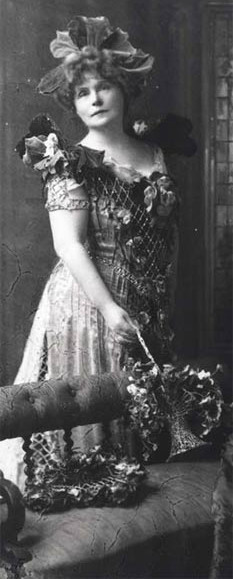CHAPTER I.
THE MONASTERY
Deep in the heart of the Caucasus mountains a wild storm was gathering. Drear shadows drooped and thickened above the Pass of Dariel,—that terrific gorge which like a mere thread seems to hang between the toppling frost-bound heights above and the black abysmal depths below,—clouds, fringed ominously with lurid green and white, drifted heavily yet swiftly across the jagged peaks where, looming largely out of the mist, the snow-capped crest of Mount Kazbek rose coldly white against the darkness of the threatening sky. Night was approaching, though away to the west a broad gash of crimson, a seeming wound in the breast of heaven, showed where the sun had set an hour since. Now and again the rising wind moaned sobbingly through the tall and spectral pines that, with knotted roots fast clenched in the reluctant earth, clung tenaciously to their stony vantage ground; and mingling with its wailing murmur, there came a distant hoarse roaring as of tumbling torrents, while at far-off intervals could be heard the sweeping thud of an avalanche slipping from point to point on its disastrous downward way. Through the wreathing vapours the steep, bare sides of the near mountains were pallidly visible, their icy pinnacles, like uplifted daggers, piercing with sharp glitter the density of the low-hanging haze, from which large drops of moisture began presently to ooze rather than fall. Gradually the wind increased, and soon with sudden fierce gusts shook the pine-trees into shuddering anxiety,—the red slit in the sky closed, and a gleam of forked lightning leaped athwart the driving darkness. An appalling crash of thunder followed almost instantaneously, its deep boom vibrating in sullenly grand echoes on all sides of the Pass, and then—with a swirling, hissing rush of rain—the unbound hurricane burst forth alive and furious. On, on! splitting huge boughs and flinging them aside like straws, swelling the rivers into riotous floods that swept hither and thither, carrying with them masses of rock and stone and tons of loosened snow—on, on! with pitiless force and destructive haste, the tempest rolled, thundered, and shrieked its way through Dariel. As the night darkened and the clamour of the conflicting elements grew more sustained and violent, a sudden sweet sound floated softly through the turbulent air—the slow, measured tolling of a bell. To and fro, to and fro, the silvery chime swung with mild distinctness—it was the vesper-bell ringing in the Monastery of Lars far up among the crags crowning the ravine. There the wind roared and blustered its loudest; it whirled round and round the quaint castellated building, battering at the gates and moving their heavy iron hinges to a most dolorous groaning; it flung rattling hailstones at the narrow windows, and raged and howled at every corner and through every crevice; while snaky twists of lightning played threateningly over the tall iron Cross that surmounted the roof, as though bent on striking it down and splitting open the firm old walls it guarded. All was war and tumult without :—but within, a tranquil peace prevailed, enhanced by the grave murmur of organ music; men’s voices mingling together in mellow unison chanted the Magnificat, and the uplifted steady harmony of the grand old anthem rose triumphantly above the noise of the storm. …
[We are part-way down page 2. A new paragraph begins somewhere on page 3.]

Although I’ve been vaguely aware of her for quite some time, I’ve never read any of the novels of the original New-Ager, Marie Corelli. She’s mostly forgotten today, but she was very big in her day, outselling contemporary authors whose names have lived on, such as Kipling, Wells and Doyle. Having taken Ardath: A Story of a Dead Self (1889) out of a box to read the letters stuffed into it, I thought I should have a quick glance at it and it certainly is a little…ahem…florid to the modern eye.
It’s hard to believe, I know, but the literary establishment criticised her for being overly melodramatic! Philistines obviously. She was also described as “a woman of deplorable talent who imagined that she was a genius, and was accepted as a genius by a public to whose commonplace sentimentalities and prejudices she gave a glamorous setting” and “combining the imagination of a Poe with the style of an Ouida and the mentality of a nursemaid”. Queen Victoria, however, was amused; Corelli was her favourite novelist.
She is known to have pretended to be able to speak Italian (she was born Mary Mackay) and was the inspiration for E. F. Benson’s Emmeline “Lucia” Lucas character. She was convicted of hoarding food during World War I, which didn’t do her reputation any good at all. I seem to remember Lucia got into a similar scrape (or was it Mapp?) but avoided prosecution.
Was she a lesbian? Difficult to say, as with many Victorian people who had what seem unusually close relationships with people of the same sex. What we do know is that she lived for forty years with her companion, Bertha Vyer, left everything to her when she died and that “over the fireplace in the fine, old spacious lounge at Mason Croft the initials M. C. and B. V. were carven into one symbol. And it was the symbol of life.”
And apparently, though no one told me (or at least told me loudly enough), there is a movie—Angel (2007)—that is more-or-less her biography. Based on a book by…Elizabeth Taylor. What?! Oh, it’s another Elizabeth Taylor. Directed by François Ozon! Why have I not seen it yet?